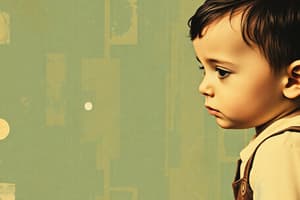Podcast
Questions and Answers
What characterizes the development of conventional faith in individuals?
What characterizes the development of conventional faith in individuals?
- Imitation of parental behaviors and attitudes about religion (correct)
- A deep understanding of spiritual concepts
- Personal exploration of various spiritual viewpoints
- Acceptance of all religious beliefs without question
Which of the following is NOT a component of conventional faith?
Which of the following is NOT a component of conventional faith?
- Imitation of religious practices
- Acceptance of spiritual inconsistencies (correct)
- Trust, hope, and love
- Questioning values and beliefs
In the context of faith development, what does the term 'reciprocal fairness' refer to?
In the context of faith development, what does the term 'reciprocal fairness' refer to?
- A rejection of personal beliefs in favor of conformity
- An indifference to moral principles
- An acknowledgment of others' viewpoints (correct)
- A blind acceptance of all values
What is a significant characteristic of late adolescence and young adulthood in the context of faith development?
What is a significant characteristic of late adolescence and young adulthood in the context of faith development?
Which of the following reflects the understanding of spiritual concepts in individuals with conventional faith?
Which of the following reflects the understanding of spiritual concepts in individuals with conventional faith?
What is the primary psychosocial stage of development for infants aged 0-1 year?
What is the primary psychosocial stage of development for infants aged 0-1 year?
During which stage does the child primarily engage in solitary play?
During which stage does the child primarily engage in solitary play?
What is the main source of pleasure for toddlers according to Freud's psychosexual stages?
What is the main source of pleasure for toddlers according to Freud's psychosexual stages?
At what age range does the pre-conceptual or pre-operational stage occur in cognitive development?
At what age range does the pre-conceptual or pre-operational stage occur in cognitive development?
What type of fears typically emerge during the toddler age range?
What type of fears typically emerge during the toddler age range?
Which significant person in a school-age child's life is primarily mentioned in the context of their development?
Which significant person in a school-age child's life is primarily mentioned in the context of their development?
What behavioral characteristic is most indicative of toddlers aged 1-3 years?
What behavioral characteristic is most indicative of toddlers aged 1-3 years?
At what age do children start using approximately 900-1,000 words?
At what age do children start using approximately 900-1,000 words?
Which of the following describes the moral development stage for preschool-aged children?
Which of the following describes the moral development stage for preschool-aged children?
What is the primary developmental theme for adolescents aged 12-18 years?
What is the primary developmental theme for adolescents aged 12-18 years?
What type of play is characteristic of school-age children?
What type of play is characteristic of school-age children?
What type of psychosexual conflict is experienced during the phallic stage?
What type of psychosexual conflict is experienced during the phallic stage?
What is the characteristic language development at 10 months of age?
What is the characteristic language development at 10 months of age?
During which stage do children begin to focus on relationships with same-sex peers?
During which stage do children begin to focus on relationships with same-sex peers?
What is the recommended sleep duration for a 3-year-old child?
What is the recommended sleep duration for a 3-year-old child?
Which accident is considered a common safety concern for infants?
Which accident is considered a common safety concern for infants?
At what age does a child typically begin to walk without support?
At what age does a child typically begin to walk without support?
What is a common behavioral indicator of a 5-year-old child?
What is a common behavioral indicator of a 5-year-old child?
What dietary recommendation is made for children aged 1 to 2 years?
What dietary recommendation is made for children aged 1 to 2 years?
Which of the following milestones typically occurs at 3 years old?
Which of the following milestones typically occurs at 3 years old?
Which action is a developmental milestone for a 2-year-old child?
Which action is a developmental milestone for a 2-year-old child?
What discipline approach is suggested for toddlers?
What discipline approach is suggested for toddlers?
At what age is it common for a child to respond to parental anger?
At what age is it common for a child to respond to parental anger?
What is a key dietary requirement for a child aged 4 to 5 years?
What is a key dietary requirement for a child aged 4 to 5 years?
Which skill is typically developed by a 4-year-old child?
Which skill is typically developed by a 4-year-old child?
How much weight does a child typically add by the age of 1?
How much weight does a child typically add by the age of 1?
At which age does a child typically develop night-time bladder control?
At which age does a child typically develop night-time bladder control?
What is expected from an 8-year-old in terms of developmental milestones?
What is expected from an 8-year-old in terms of developmental milestones?
Flashcards
Conventional Faith
Conventional Faith
A stage of faith development characterized by imitating parental behaviors and attitudes toward religion. Individuals at this stage don't fully grasp spiritual concepts but accept them through symbolic stories.
Trust, Hope, and Love in Children
Trust, Hope, and Love in Children
The development of trust, hope, and love in a child, often conflicting with their experiences with the environment.
Questioning Values and Beliefs
Questioning Values and Beliefs
The stage of faith development where individuals question values and religious beliefs to forge their own identity.
Reciprocal Fairness
Reciprocal Fairness
Signup and view all the flashcards
Individuative-Reflective Faith
Individuative-Reflective Faith
Signup and view all the flashcards
Pincer Grasp
Pincer Grasp
Signup and view all the flashcards
Stranger Anxiety
Stranger Anxiety
Signup and view all the flashcards
Weaning
Weaning
Signup and view all the flashcards
Posterior Fontanel
Posterior Fontanel
Signup and view all the flashcards
Anterior Fontanel
Anterior Fontanel
Signup and view all the flashcards
Sphincter Control
Sphincter Control
Signup and view all the flashcards
Binocular Vision
Binocular Vision
Signup and view all the flashcards
Vocalizes Words
Vocalizes Words
Signup and view all the flashcards
Stands with Support
Stands with Support
Signup and view all the flashcards
Cruising
Cruising
Signup and view all the flashcards
Sits from Standing Position
Sits from Standing Position
Signup and view all the flashcards
Deciduous Teeth
Deciduous Teeth
Signup and view all the flashcards
Follows Simple Commands
Follows Simple Commands
Signup and view all the flashcards
Cooperative Play
Cooperative Play
Signup and view all the flashcards
Imaginary Friend
Imaginary Friend
Signup and view all the flashcards
Trust vs Mistrust
Trust vs Mistrust
Signup and view all the flashcards
Autonomy vs Shame and Doubt
Autonomy vs Shame and Doubt
Signup and view all the flashcards
Initiative vs Guilt
Initiative vs Guilt
Signup and view all the flashcards
Industry vs Inferiority
Industry vs Inferiority
Signup and view all the flashcards
Identity vs Role Confusion
Identity vs Role Confusion
Signup and view all the flashcards
Oral Stage
Oral Stage
Signup and view all the flashcards
Anal Stage
Anal Stage
Signup and view all the flashcards
Phallic Stage
Phallic Stage
Signup and view all the flashcards
Latency Stage
Latency Stage
Signup and view all the flashcards
Genital Stage
Genital Stage
Signup and view all the flashcards
Sensory-Motor Stage
Sensory-Motor Stage
Signup and view all the flashcards
Sensory-Motor Stage
Sensory-Motor Stage
Signup and view all the flashcards
Pre-conceptual Stage
Pre-conceptual Stage
Signup and view all the flashcards
Concrete Operational Stage
Concrete Operational Stage
Signup and view all the flashcards
Formal Operational Stage
Formal Operational Stage
Signup and view all the flashcards
Pre-conventional Stage 1
Pre-conventional Stage 1
Signup and view all the flashcards
Study Notes
Pediatric Growth and Development
- Infants (0-1 year): Psychosocial stage is Trust vs. Mistrust. Development depends on meeting needs. Oral stage of psychosexual development, where the mouth is the primary source of pleasure and exploration. Primary need is security. Major conflict is weaning. Cognitive development is sensorimotor, focused on senses and actions. Object permanence is developing. Play is solitary, using tangible objects. Attachment figure is primarily the primary caregiver, often the mother. Fears are centered on strangers.
- Toddlers (1-3 years): Psychosocial stage is Autonomy vs. Shame and Doubt. Toddlers develop more independence and control over their actions. Play is still centered around self-expression but also includes parallel play.
- Preschoolers (3-6 years): Psychosocial stage is Initiative vs. Guilt. Children take initiative in activities and develop a sense of purpose. They begin to explore new things. Cognitive development is preoperational, thinking is very self-centered. Play is very active and imaginative, and involves others. Play is more associative, and social interaction increases.
- School-Age (6-12 years): Psychosocial stage is Industry vs. Inferiority. Learning to engage in tasks and to complete tasks with proficiency is essential at this age. School and peers play a large role in development. Cognitive development is concrete operational. Children can engage in logical reasoning. Play can be competitive and more focused on collaborative skills.
- Adolescents (12-18 years): Psychosocial stage is Identity vs. Role Confusion. Discovering one's sense of self is important at this stage. Role models, peers, and social expectations become significant influences. Cognitive development is formal operational, abstract thinking develops. Play can involve peers and be more competitive or cooperative.
Nutritional Considerations
- Breastfeeding is recommended for at least 2 years. Caloric requirements change through different developmental stages. Healthy eating habits are important for growth.
- Feeding guidelines vary, but for general nutrition: 2,100-2,400 calories per day is a suggested range for children, and reducing consumption of sugary drinks and desserts is a critical piece of the nutritional plan.
Sleep
- Sleep duration varies with the stage of development, from 10-12 hours a day for infancy to 8-10 hours for adolescence. Adequate sleep is vital for both physical and cognitive development.
Safety
- Common accidents for infants and toddler are suffocation, scalding burns, choking hazards, etc. Emphasis is placed on safe environments and prevention measures.
Developmental Indicators and Milestones
- Key milestones include physical, mental, and social development. Developmental milestones are age-specific, but individual differences are expected. This information should not be interpreted as a set of rules but as an overview of normal development.
Language Development
- Language development occurs in stages, starting from simple sounds to complex sentences. The rate of development differs among children, but most follow a predictable pattern.
Moral Development
- Moral development progresses with age as described in the Kohlberg stages.
Studying That Suits You
Use AI to generate personalized quizzes and flashcards to suit your learning preferences.
Related Documents
Description
Test your knowledge on the stages of pediatric growth and development from infancy through preschool. This quiz covers key psychosocial and cognitive milestones within each age group. Discover the significant developmental tasks and challenges encountered during these formative years.




